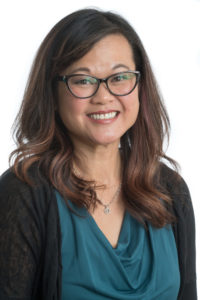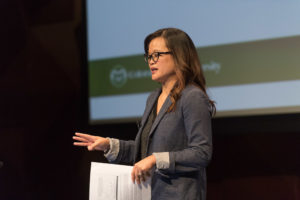
The School of Education at Colorado State University is pleased to announce the addition of Assistant Professor OiYan Poon to the faculty of its Higher Education Leadership doctoral degree specialization. Poon, one of two hires through the School’s cluster hire initiative in late 2016, comes to CSU by way of Loyola University in Chicago.
From business studies to student affairs
Poon earned her B.S. in marketing management from Boston College. While juggling work as a resident adviser and as a public relations intern, she realized she found her resident adviser role much more fulfilling and rewarding.
“I loved working with students,” she said. “I loved mentoring them and helping them figure out what resources are available to them on campus. Both jobs were exhausting, but being a resident adviser felt more energizing and sustaining.”
At her mentor’s suggestion, Poon decided to pursue a career in student affairs, turning down a job offer to work in Silicon Valley after graduation.
Poon earned her M.Ed. in college student affairs administration at the University of Georgia, and accepted a job at George Mason University near Washington, D.C., working as the university’s first director of Asian American student affairs.
On-the-job experience leads to research aspirations
Following her time at GMU, Poon was recruited to the University of California, Davis into a student affairs position that was created in response to a string of hate crimes against Asian Americans in the area. The first person to serve in this role, Poon worked as an advocate for the university’s Asian American students, addressing various disparities on campus for this population.
“It was an intensive job,” she reflected. “I had no budget and was one person; at the time, Asian American students made up 40 percent of the total student population of 30,000. It was a lot.”
While working with students who were in distress – students who were academically dismissed, facing mental health or economic challenges, undocumented or facing deportation – Poon analyzed their situations to help determine ways to improve their situations and began to recognize patterns.
“I regularly met with people in the university administration who had power and money to help create change,” said Poon. “For example, I suggested that there might be benefits to creating programs around bridging generational divides and navigating cultural differences between students and their parents or families on expectations and such. I thought it would go a long way toward stemming the academic push-out of this population.”
Administrators were interested, she said, but asked for supporting data.
“All I had was anecdotal examples and experiential knowledge of these needs,” she said.
Finally, an ethnic studies professor told Poon to get the data through pursuit of a doctoral degree – something Poon wasn’t aware was an option.
“I didn’t grow up in academia; I’m a first-generation graduate,” she said. “I didn’t know I could get a Ph.D. to collect and analyze data to make the case that a program was needed.”
Poon earned a Ph.D. in race and ethnic studies in education from the University of California, Los Angeles, and became active in determining how to affect policies and practice in higher education.
“I wanted to bridge daily practice, student experience, and life on campus with more structural ways to make things better for everyone on campus, and those who want to pursue higher education,” she said. “I looked for ways to inform higher education leaders, to ensure they’re meeting their responsibilities in serving these communities.”
Expert knowledge, in demand

Throughout her time in research, Poon has focused on Asian Americans and their relationships and experiences with higher education. Poon noticed the way affirmative action and admissions were being discussed in the media, and was frustrated by the prevalence of myths, untruths, fear and racism – and the way this discourse perpetuates misconceptions of affirmative action, Asian Americans, and college access.
“Originally, I thought I wanted to broaden my research to include student activism and career development among Asian Americans, but I see the need for my expertise in this niche area around affirmative action in the public debate,” she said.
Following public discourse and debate over the past 10 years, her focus has shifted more strongly to focus on the racial politics of college access policies and affirmative action in particular.
“Others often speak about Asian Americans while debating affirmative action,” said Poon, “but Asian Americans haven’t really been given the opportunity to speak about their interests, and their engagement in the debate – for decades – hasn’t been acknowledged.”
She recently began a research project focused on how Asian Americans feel about affirmative action, interviewing 36 Asian Americans around the country who have been publicly engaged in the affirmative action debate. Half of those interviewees were for affirmative action; half were against.
“Right now, we’re synthesizing the data and patterns,” she explained. “I want to know why these Asian Americans feel one way or another about the issue – how did they develop their understanding of affirmative action; how and why did they get involved in the public debate. I want to focus on the people and the communities, and how they’re talking about it.”
Poon is considered an expert on the subject of affirmative action and how it relates to the Asian American population, interviewed often by bloggers, radio hosts and more. For links to her most recent interviews, visit Poon’s faculty page on the School of Education website.
Continuing to make her mark
Poon is a student affairs practitioner at heart. While she no longer works directly with undergraduate students, Poon has been intentional about building relationships with them at each university, a tradition she hopes to continue at CSU. As an assistant professor in the HEL program, she currently teaches a dissertation proposal writing course for these doctoral students – each of whom works full-time in addition to pursuing a Ph.D. – and is looking forward to catching a glimpse of these students’ dissertation projects.
“I’m excited to see the directions in which the students are heading,” she said.
Poon’s impact on the field of student affairs continues to grow. Her research is used as a resource by others in the field, a source of evidence for people now seeking the same information she sought when she started out. She hopes to keep making a difference through her research and teaching.
“Being part of a Research I university is exciting,” she said. “I’m hoping to apply for grants so I can dive more deeply into my research agenda, and consider what my findings mean for racial justice and equity more generally.”
The School of Education is part of CSU’s College of Health and Human Sciences.